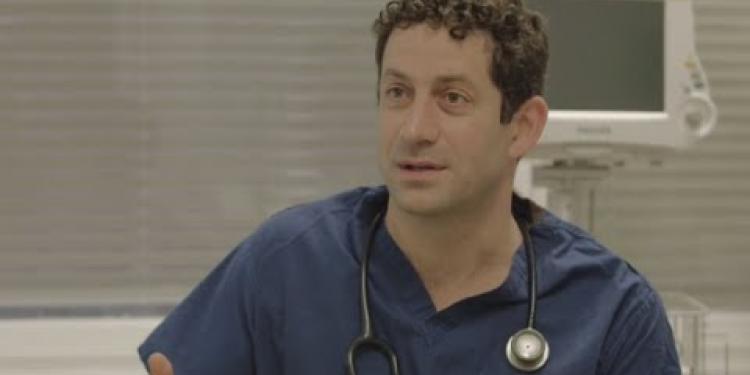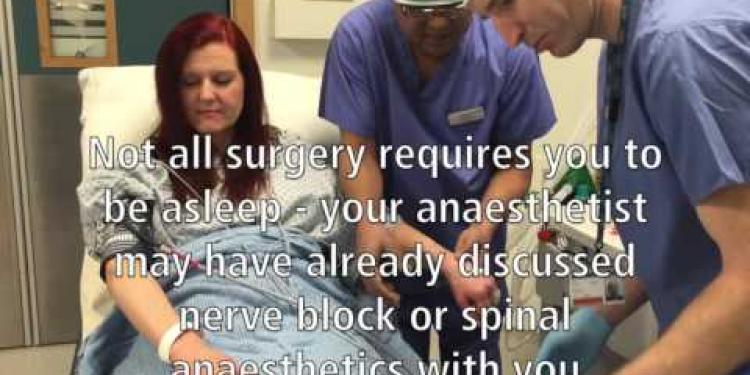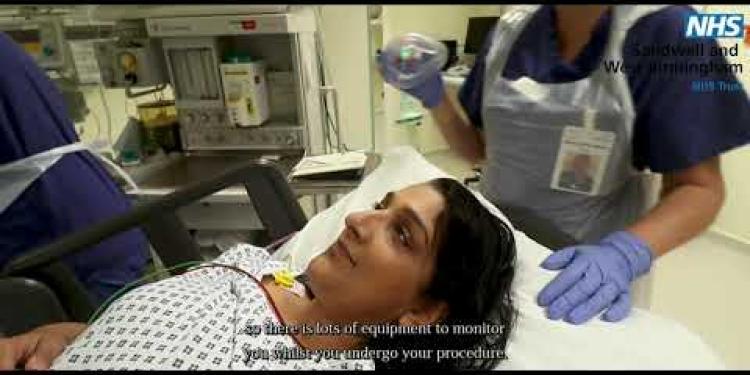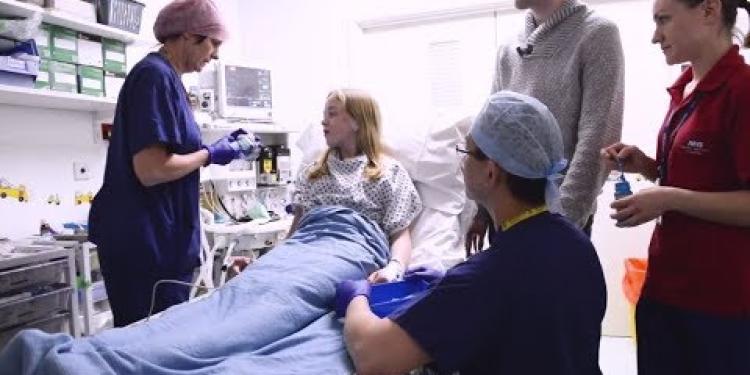Important Information On Using This Service
- Ergsy carefully checks the information in the videos we provide here.
- Videos shown by YouTube after a video has completed have NOT been reviewed by ERGSY.
- To view, click the arrow in the center of the video.
Using Subtitles and Closed Captions
- Most of the videos you find here will have subtitles and/or closed captions available.
- You may need to turn these on and choose your preferred language.
Turn Captions On or Off
- Go to the video you'd like to watch.
- If closed captions (CC) are available, settings will be visible on the bottom right of the video player.
- To turn on captions, click settings.
- To turn off captions, click settings again.
Find A Professional
Having an Anaesthetic for Your Operation - For Over 8s
What is an Anaesthetic?
An anaesthetic is a special medicine that makes you go to sleep or stops you from feeling pain during an operation. There are different types of anaesthetics: general anaesthetic, which makes you go to sleep, and local anaesthetic, which numbs a specific part of your body. Your doctor will talk to you and your parents about which one is best for you.Before Your Operation
Before your operation, you might have a meeting with an anaesthetist - a doctor who specializes in giving anaesthetics. They will ask you about your health, any allergies, and if you have had anaesthetic before. Don't worry, you can ask them any questions you have. On the day of your operation, you might be asked not to eat or drink for a few hours before.During Your Operation
When it's time for your operation, you will be taken to the operating room. If you're having a general anaesthetic, you might breathe it in through a mask or receive it through a small needle in your hand. You'll fall asleep very quickly and won't feel anything during the operation. If you're having a local anaesthetic, you will stay awake, but the area of your body where you are having the operation will be numb.After Your Operation
When your operation is finished, you will wake up in a recovery room. Nurses and doctors will be there to make sure you are okay. You might feel a bit sleepy or groggy, and it's normal to feel this way for a little while. If you have any pain or feel sick, let the nurse know so they can help you feel better.Going Home
Once you’re feeling better and the doctors are happy with your recovery, you can go home. The anaesthetist will give you some advice to follow, such as resting and taking it easy for the next few days. You might also be given some medicine to help with any pain. Make sure to follow the instructions given by your healthcare team for the best recovery.Don't Be Afraid to Ask Questions
It's absolutely okay to ask lots of questions. Surgery can be a bit scary, but doctors and nurses are there to help you and make sure you feel safe and comfortable. Whether it's about the anaesthetic, the surgery, or what happens afterwards, don’t hesitate to speak up. Having an operation might seem daunting, but understanding what to expect can help you feel more prepared and confident. Your medical team is there to ensure everything goes smoothly and to help you get back to feeling your best as soon as possible.Having an Anaesthetic for Your Operation - For Over 8s
What is an Anaesthetic?
An anaesthetic is a special medicine. It helps you sleep or stops pain during an operation. There are two main types: - **General anaesthetic**: Makes you sleep. - **Local anaesthetic**: Numbs a certain part of your body. Your doctor will talk to you and your parents about which is best for you.Before Your Operation
Before your operation, you will meet an anaesthetist. An anaesthetist is a doctor who gives anaesthetics. They will ask about your health and if you have allergies. You can ask them any questions. On the day of your operation, you might not be able to eat or drink for a few hours before.During Your Operation
When it's time, you will go to the operating room. - **General anaesthetic**: You might breathe through a mask or get it through a small needle in your hand. You will fall asleep quickly and won't feel anything. - **Local anaesthetic**: You stay awake, but the part getting operated on will be numb.After Your Operation
Afterwards, you will wake up in a recovery room. Nurses and doctors will be there to help you. You might feel sleepy or groggy, and that's normal. If you have pain or feel sick, tell the nurse. They can help you feel better.Going Home
Once you feel better and the doctors are happy, you can go home. The anaesthetist will give you advice, like resting for a few days. You might get medicine for pain. Follow the healthcare team's instructions to get better.Don't Be Afraid to Ask Questions
It's okay to ask questions. Surgery can be a little scary, but doctors and nurses want to help you feel safe. Ask about the anaesthetic, the surgery, or what happens after. Knowing what to expect can make you feel ready and confident. Your medical team is there to help everything go well and to help you feel better soon.Frequently Asked Questions
What is an anaesthetic?
An anaesthetic is a medicine that stops you feeling pain during your operation. There are different types of anaesthetics, including general anaesthetics, which make you sleep, and local anaesthetics, which numb part of your body.
Will I be awake during the operation?
This depends on the type of anaesthetic used. With a general anaesthetic, you will be asleep. With a local or regional anaesthetic, you may be awake but won't feel pain in the area being operated on.
How is the anaesthetic given?
Anaesthetics can be given through an injection, inhaled as a gas, or applied as a cream or gel to your skin.
Will I feel anything during the operation?
With a general anaesthetic, you won't feel anything because you will be asleep. With local or regional anaesthetics, you won't feel pain in the numbed area.
How long does it take for the anaesthetic to wear off?
This can vary, but anaesthetic effects typically wear off within a few hours after the operation. Your medical team will monitor you until you are fully awake and ensure you're comfortable.
Are there any side effects of anaesthetics?
Some people may experience side effects such as nausea, sore throat, or drowsiness. Most side effects are mild and go away on their own.
Is anaesthesia safe?
Anaesthesia is generally very safe. Anaesthetists are highly trained doctors who monitor you closely to ensure your safety during the operation.
Can I eat or drink before having an anaesthetic?
You will be given specific instructions about fasting before your surgery. Generally, you should not eat or drink anything for several hours before the procedure.
What if I'm scared about getting an anaesthetic?
It's natural to feel a bit worried. Talk to your anaesthetist or nurse about your concerns. They can explain what will happen and help you feel more comfortable.
Will I need to stay in the hospital after the operation?
This depends on the type of surgery and anaesthetic used. Some people go home the same day, while others may need to stay in the hospital for a day or two.
Can I have someone with me while I get the anaesthetic?
Usually, a parent or guardian can be with you until you go to the operating theatre. After that, they will need to wait while you are in surgery but will be informed when you are in recovery.
Will I remember anything after the anaesthetic?
With general anaesthesia, you typically won't remember anything from the time you start to go to sleep until you wake up. With local anaesthesia, you may remember the procedure but won't feel pain.
What happens if I have an allergic reaction to the anaesthetic?
Allergic reactions to anaesthetics are very rare. Your anaesthetist is trained to handle any allergic reactions and will take immediate action to ensure your safety.
What should I do if I feel unwell after the operation?
Inform the medical staff immediately if you feel unwell after your operation. They will assess and manage any symptoms or side effects you may experience.
Can I participate in activities after having an anaesthetic?
After a general anaesthetic, you may need some rest and recovery time. Avoid activities that require alertness for at least 24 hours. Your doctor will provide specific advice based on your surgery and recovery.
What is an anaesthetic?
An anaesthetic is a special medicine. It stops you from feeling pain when a doctor does an operation. There are two types:
- Local anaesthetic: This numbs a small area, so you stay awake but can’t feel pain there.
- General anaesthetic: This makes you sleep during the operation.
If you feel worried about anaesthetics, you can talk to a doctor or nurse. You can also ask someone you trust to help you understand.
An anaesthetic is a medicine that helps you not feel pain during an operation. There are different kinds of anaesthetics. Some are general anaesthetics, which make you sleep. Others are local anaesthetics, which make one part of your body numb.
Will I be awake during the operation?
Will I be asleep while the doctors do the surgery?
It depends on the kind of medicine you get. If you get medicine that makes you sleep, you will be asleep during the operation. If you get medicine for just one part of your body, you will be awake, but you won't feel any pain where the doctor is working.
How do you get the medicine to make you sleepy?
You can get medicine to make you numb or sleepy in different ways. It can be a shot with a needle, a gas you breathe in, or a cream or gel put on your skin.
If you find reading hard, you can try reading with someone to help. You can also use picture aids or listen to someone read it out loud.
Will I feel anything during the operation?
No, you will not feel anything during the operation. The doctor will give you special medicine so you do not feel pain. This is called anesthesia. It helps you stay asleep and feel comfortable.
If you feel worried, tell your nurse or doctor. They can answer your questions and help you feel better.
You can also bring a favorite toy or listen to music to help you feel relaxed before the operation.
When you have a big sleep medicine (called a general anaesthetic), you go to sleep and don't feel anything.
If you have a small sleep medicine (called local or regional anaesthetics), you stay awake but don't feel any pain in the part of your body where the medicine is given.
Helpful tip: If you're worried, talk to your doctor or nurse. They can help you understand and feel safe.
When will the numb feeling go away after you get medicine for pain?
The sleepy medicine from an operation can wear off in a few hours. Your doctors and nurses will watch you until you wake up. They will make sure you feel okay.
Do anaesthetics have any side effects?
Anaesthetics are medicines that stop pain during surgery. Sometimes, they might cause side effects. This means they could make you feel different for a short time.
Here are some common side effects you might feel:
- Feeling sleepy or tired
- Feeling dizzy or wobbly
- Feeling sick or wanting to throw up
- Getting a sore throat
If you feel any side effects, tell a doctor or nurse. They are there to help you feel better. You can also talk to someone you trust about how you feel. Remember, if you're scared, it's okay to ask questions or use tools like pictures or videos to understand better. These can make things easier to know what to expect.
Some people might feel unwell, have a sore throat, or feel sleepy. Most of the time, these feelings are not serious and will stop by themselves.
Is anaesthesia safe?
Anaesthesia is medicine to help you not feel pain during a surgery or a procedure.
Anaesthesia is mostly safe for most people. But like any medicine, it can have risks.
Doctors are trained to give anaesthesia safely. They watch you closely during the procedure.
It is important to tell your doctor about your health. This helps choose the best anaesthesia for you.
If you are scared, you can ask your doctor questions. It can help to have someone with you for support and comfort.
Using calming techniques, like deep breathing or listening to music, can also help.
Being put to sleep for an operation is usually very safe. The doctors who help with this are experts. They watch you carefully to keep you safe during the surgery.
Can I eat or drink before having an anaesthetic?
Before you have an anaesthetic, you should not eat or drink anything. This is very important. Make sure to ask your doctor or nurse what time you need to stop eating or drinking. They will tell you exactly when to stop.
If you have trouble remembering, you can set an alarm or ask someone to remind you. Also, try writing it down so you do not forget.
You will get instructions on when to stop eating before your surgery. Usually, you cannot eat or drink for a few hours before your surgery.
What if I'm scared about getting an anaesthetic?
It's okay to feel scared about getting an anaesthetic. Here are some things you can do to feel better:
- Talk to your doctor or nurse. They can explain what will happen and answer your questions.
- Ask if a family member or friend can stay with you to help you feel calm.
- Practice deep breathing to help you relax.
- Think about or look at things that make you happy before the anaesthetic.
Remember, you are not alone, and there are people who can help you feel safe and comfortable.
It is okay to feel worried. Tell your anaesthetist or nurse what you are scared of. They can tell you what will happen. This can help you feel better.
Will I need to stay in the hospital after the operation?
Will I have to stay in the hospital after the surgery?
The doctor will tell you if you need to stay in the hospital after your operation.
Some people stay in the hospital for a while to rest and get better.
Other people can go home the same day.
Ask your doctor what will happen after your operation. They will give you instructions.
If you find it hard to remember things, you can:
- Write notes on paper
- Ask someone you trust to help you
- Use a voice recorder on a phone
This depends on the kind of surgery and medicine they give you to make you sleep. Some people go home the same day. Other people might need to stay in the hospital for one or two days.
Can I have someone with me when I get the sleepy medicine?
You can ask a friend or family member to stay with you when you get the sleepy medicine. You feel less worried when someone is with you.
If you need help understanding, you can use pictures, videos, or ask someone to explain things to you.
Your mom, dad, or the person taking care of you can stay with you before your operation. When you go for the operation, they will wait outside. They will be told when you wake up.
Will I remember anything after the anaesthetic?
An anaesthetic is medicine that helps you sleep during an operation. It makes sure you don’t feel anything.
When you wake up, you might not remember what happened during the operation. This is normal and okay.
If you have questions, you can ask your doctor or nurse. They can help you understand.
To help you feel better, you can:
- Ask someone you trust to explain things to you.
- Write down any questions you have before the operation.
- Use pictures or drawings to help understand.
When you have general anaesthesia, you go to sleep and don't remember anything. You wake up when it's all done. With local anaesthesia, you stay awake. You might remember what happens, but it won't hurt.
If you find reading hard, you can use some tools to help. Audiobooks or text-to-speech apps can read out loud to you. You can also use apps that make reading easier by changing the size or color of words. Don't be afraid to ask someone to read with you or to help explain things if you need it.
What if I have an allergy to the medicine that makes me sleep during an operation?
Some people can get sick from the medicine that helps you sleep during an operation. This is called an allergy.
If this happens, the doctors and nurses will help you right away.
They know what to do to make you feel better. They will give you medicine to stop the allergy.
It is important to tell your doctor if you have any allergies. You can use pictures or ask someone to help explain your allergies before the operation.
It is not common for people to have allergies to medicines that make you sleep during surgery. The doctor who helps you sleep is ready to help if you do have a reaction. They will make sure you stay safe.
What to Do if You Feel Sick After Your Operation
If you feel sick after your operation, tell a doctor or a nurse. They can help you feel better.
Here are some tips:
- Rest as much as you can.
- Drink water and eat healthy foods.
- Ask someone to help you with things you find hard to do.
If you still feel sick, call a doctor or go to the hospital.
You might find it helpful to use a notebook or a voice recorder to remember how you feel. This can help the doctor understand what you are going through.
Tell the doctors and nurses right away if you feel sick after your operation. They will check how you are feeling and help with any problems you have.
Can I join in activities after having an anaesthetic?
After you have an anaesthetic, your body needs time to rest. It's like after waking up from a big sleep. Here are some tips:
- Take it easy. It's good to sit down and relax.
- Ask someone to stay with you, to help out.
- Wait a day or two before doing big activities like sports or riding a bike.
- If you feel dizzy or tired, stop and rest.
- Drink water and eat light foods.
Remember: Always ask the doctor what is best for you!
After you have had medicine to make you sleep during an operation, you will need to rest. Do not do anything that needs you to be very awake for at least one day. Your doctor will tell you what you should do after your operation to help you get better.
Useful Links
Useful links from: Understanding the NHS: How to Access Services
- NHS - How to access NHS services in England Comprehensive guide on how to access NHS services, including primary care, hospital services, emergency care, and more.
- Mind - Mental Health Charity A UK charity providing advice and support to empower anyone experiencing a mental health problem. Includes a range of resources and information on accessing mental health services.
- Citizens Advice - Help with health costs Citizens Advice offers guidance on how to get financial help with health costs including prescription charges, dental services, eye care and travel costs.
- British Heart Foundation - Getting the treatment you need The British Heart Foundation provides detailed information about accessing heart-related treatments and navigating NHS services for heart conditions.
Useful links from: What to expect on the day of your operation
- NHS - What happens on the day of your operation Official NHS guide covering practical information on what to expect on the day of your operation, including preparation and what happens before and after surgery.
- Macmillan Cancer Support - Surgery Comprehensive information from Macmillan Cancer Support on what to expect on the day of cancer surgery, preparation tips, and aftercare advice.
- British Heart Foundation - Heart Surgery: What to expect Guidance from the British Heart Foundation on what patients can expect on the day of heart surgery, including preparation, procedure details, and recovery.
- Versus Arthritis - Preparing for Surgery Advice from Versus Arthritis on how to prepare for joint surgery, including what happens on the day of the operation, and tips for a smooth recovery.
Useful links from: Having an operation at the Children’s Centre
- NHS - Operations for children Information from the NHS about operations for children, including pre-operative assessments, what happens on the day of the operation, and post-operative care.
- NHS - What to expect when your child has an operation An NHS guide on what to expect when your child is undergoing an operation, detailing how to prepare your child, what will happen during the operation, and the recovery process.
- Great Ormond Street Hospital - Preparing your child for surgery Great Ormond Street Hospital's comprehensive guide on preparing a child for surgery, including explanations of the surgical process, coping tips, and what to bring to the hospital.
- Together for Short Lives - Children's operations A UK-based charity, Together for Short Lives, offers resources and support for families with children who need operations, focusing on palliative care and support throughout the surgical process.
Useful links from: Your Operation at East Surrey Hospital
- East Surrey Hospital - Patient Information Official patient information guides from East Surrey Hospital, providing details about preparing for your operation and what to expect during your stay.
- NHS - Preparing for Surgery NHS guide on how to prepare for surgery, including preoperative assessment, what to bring to the hospital, and how to plan for your recovery.
- Macmillan Cancer Support - Preparing for Surgery Macmillan Cancer Support offers information and support for patients preparing for surgery, focusing on physical and emotional wellbeing.
- Mind - Going into Hospital Mental health charity Mind provides advice on how to manage your mental health when going into hospital, including what to expect and how to find support.
Useful links from: Inpatient Surgery at North Bristol NHS Trust
- North Bristol NHS Trust - Inpatient Surgery Information on planned admissions and inpatient surgery procedures at North Bristol NHS Trust. Provides guidelines, pre-operative and post-operative care, and contact details for further assistance.
- NHS - Preparing for Surgery A comprehensive guide by NHS on how to prepare for surgery. Includes tips on managing anxiety, what to bring to the hospital, understanding the consent process, and information on various types of surgery.
- Macmillan Cancer Support - Surgery for Cancer Detailed information from Macmillan Cancer Support about surgical treatments for cancer patients, including what to expect before, during, and after surgery. Offers support resources and contact details for further help.
- British Heart Foundation - Heart Surgery Resources and guidance from the British Heart Foundation regarding heart surgery. Covers different types of heart surgery, preparation, recovery, and lifestyle changes post-surgery.
Useful links from: What to expect when visiting our hospitals for surgery | Theatres
- NHS - Preparing for Surgery Comprehensive guide by the NHS on what to expect and how to prepare for surgery. Covers pre-operation, during the operation, and recovery.
- NHS - Your Hospital Stay Information from the NHS about what happens when you stay in the hospital, including what to bring, what to expect, and your rights.
- Royal College of Anaesthetists - Patient Information Resources provided by the Royal College of Anaesthetists offering detailed information on what to expect before, during, and after receiving anesthesia.
- Macmillan Cancer Support - Surgery Guides and support from Macmillan Cancer Support focusing on surgery for cancer patients, including pre-operation tips and recovery advice.
Useful links from: Having an operation in Oxford Children's Hospital with YiPpEe
- Oxford Children's Hospital - OUH Information about the Oxford Children's Hospital, a part of the Oxford University Hospitals NHS Foundation Trust, offering comprehensive medical care for children.
- YiPpEe - Oxford University Hospitals YiPpEe (Your Pre-Operative Plan for an Excellent Experience) helps children and their families prepare for an operation at the Oxford Children's Hospital.
- NHS Choices - Preparing Your Child for Hospital NHS guide on how to prepare your child for a hospital stay or operation, offering tips and advice to reduce anxiety and stress.
- Children's Health and Wellbeing - Action for Children Action for Children supports children's health and wellbeing by providing key resources and information to parents, helping them support their children through medical procedures.
More Videos of Interestdiagnosis
Have you found an error, or do you have a link or some information you would like to share? Please let us know using the form below.
- Ergsy carfully checks the information in the videos we provide here.
- Videos shown by Youtube after a video has completed, have NOT been reviewed by ERGSY.
- To view, click the arrow in centre of video.
- Most of the videos you find here will have subtitles and/or closed captions available.
- You may need to turn these on, and choose your preferred language.
- Go to the video you'd like to watch.
- If closed captions (CC) are available, settings will be visible on the bottom right of the video player.
- To turn on Captions, click settings .
- To turn off Captions, click settings again.







